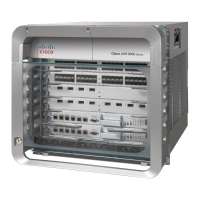120
Cisco ASR 9000 Series Aggregation Services Router Getting Started Guide
OL-28417-02
Introduction to the Cisco ASR 9000 Series Aggregation Services Router
Router Management Interfaces
Management Interfaces
Although there is no need to set up general router configuration information, you do need to configure
management interfaces manually. Configure management ports on RSP0, RSP1, or both at the same time
using:
• Telnet
• SSH (v1 and v2)
• Console Server
Router Management Interfaces
The router provides different router management interfaces, described in the following sections:
• Command-Line Interface, page 28
• Extensible Markup Language API, page 28
• Simple Network Management Protocol, page 29
Command-Line Interface
The CLI is the primary user interface for configuring, monitoring, and maintaining routers that run
Cisco IOS XR software. The CLI allows you to directly and simply execute Cisco IOS XR commands.
All procedures in this guide use CLI. Before you can use other router management interfaces, you must
first use the CLI to install and configure those interfaces.
For more information on CLI procedures for other tasks, such as hardware interface and software
protocol management tasks, see the Cisco IOS XR software documents.
Extensible Markup Language API
The Extensible Markup Language (XML) application programming interface (API) is an XML interface
used for rapid development of client applications and perl scripts to manage and monitor the router.
Client applications can be used to configure the router or request status information from the router by
encoding a request in XML API tags and sending it to the router. The router processes the request and
sends the response to the client in the form of encoded XML API tags. The XML API supports readily
available transport layers, including Telnet, SSH, and Secure Socket Layer (SSL) transport.

